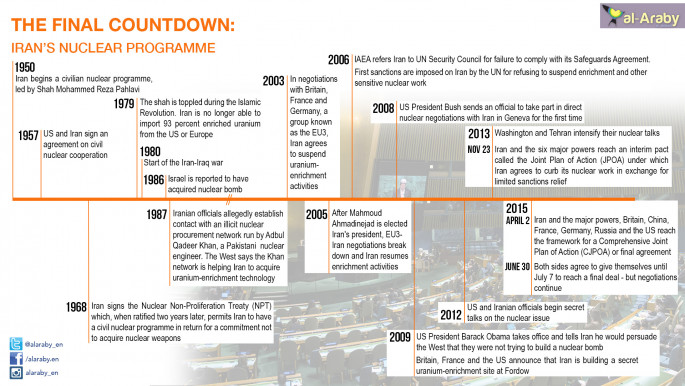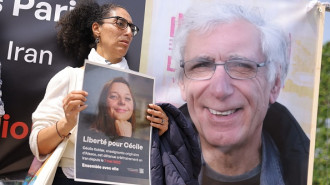Iran, world powers sign nuclear deal
After weeks of marathon negotiations, Iran and six powers reached historic nuclear deal that would bring sanctions relief in exchange for curbs on Tehran's nuclear programme, diplomats said Tuesday.
The landmark Iran nuclear agreement was reached Tuesday after clearing final obstacles, and a senior diplomat said it included a compromise between Washington and Tehran that would allow UN inspectors to press for visits to Iranian military sites as part of their monitoring duties.
Under the deal, Tehran would have the right to challenge the UN request and an arbitration board composed of Iran and the six world powers that negotiated with it would have to decide on the issue.
Among the biggest sticking ponints this week has been Iran's insistence that a United Nations Security Council arms embargo and ban on its ballistic missile programme dating from 2006 be lifted immediately if an agreement is reached.
Russia, which sells weapons to Iran, has publicly supported Tehran on the issue.
However, a senior Western diplomat said earlier in the week the six powers remained united, despite Moscow's and Beijing's well-known dislike of the embargos. 
No new 'red lines'
Western governments have long claimed that Iran was aiming to build nuclear bombs and using its civilian atomic energy programme to cloak its intention, a claim Iran strongly rejects.
The goal of the deal is to increase the time it would take for Iran to produce enough enriched uranium fuel for a single weapon to at least one year from current estimates of 2-3 months.
If there is a deal, the limits on Iran's enrichment programme are expected to be in place for at least a decade.
Other problematic issues in the talks are access for inspectors to military sites in Iran, answers from Tehran over past activity and the overall speed of sanctions relief.
Kerry and his Iranian counterpart, foreign minister Zarif have met nearly every day since Kerry arrived in Vienna more than two weeks ago for what was intended to be the final phase in a negotiation process that began with an interim nuclear deal clinched in November 2013.
An agreement would be the biggest step towards rapprochement between Iran and the West since the 1979 Islamic Revolution, although both sides are likely to remain wary of each other even if a deal is concluded.
In separate comments, Iran's President Hassan Rouhani suggested the talks could go either way while Iranian Supreme Leader Ali Khamenei said Tehran would continue its fight against "global arrogance" - referring to the United States.
According to his website, Khamenei was asked by a student what would happen to the "fight against global arrogance" after the completion of the nuclear talks and the supreme leader replied that fight must go on.
"Fighting global arrogance is the core of our revolution and we cannot put it on hold. Get ready to continue your fight against the global arrogance," Khamenei was quoted as saying. "The US is the true embodiment of the global arrogance."
But Khamenei did not set any new "red lines" for his negotiators as he did in a tough speech two weeks ago.
President of the Islamic Republic, Hassan Rouhani, is expected to address the nation on Monday afternoon, adding to Iran's anticipation.





 Follow the Middle East's top stories in English at The New Arab on Google News
Follow the Middle East's top stories in English at The New Arab on Google News

![The law could be enforced against teachers without prior notice [Getty]](/sites/default/files/styles/image_330x185/public/2178740715.jpeg?h=a5f2f23a&itok=xMdFOAIF)
